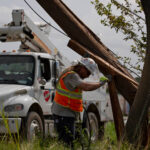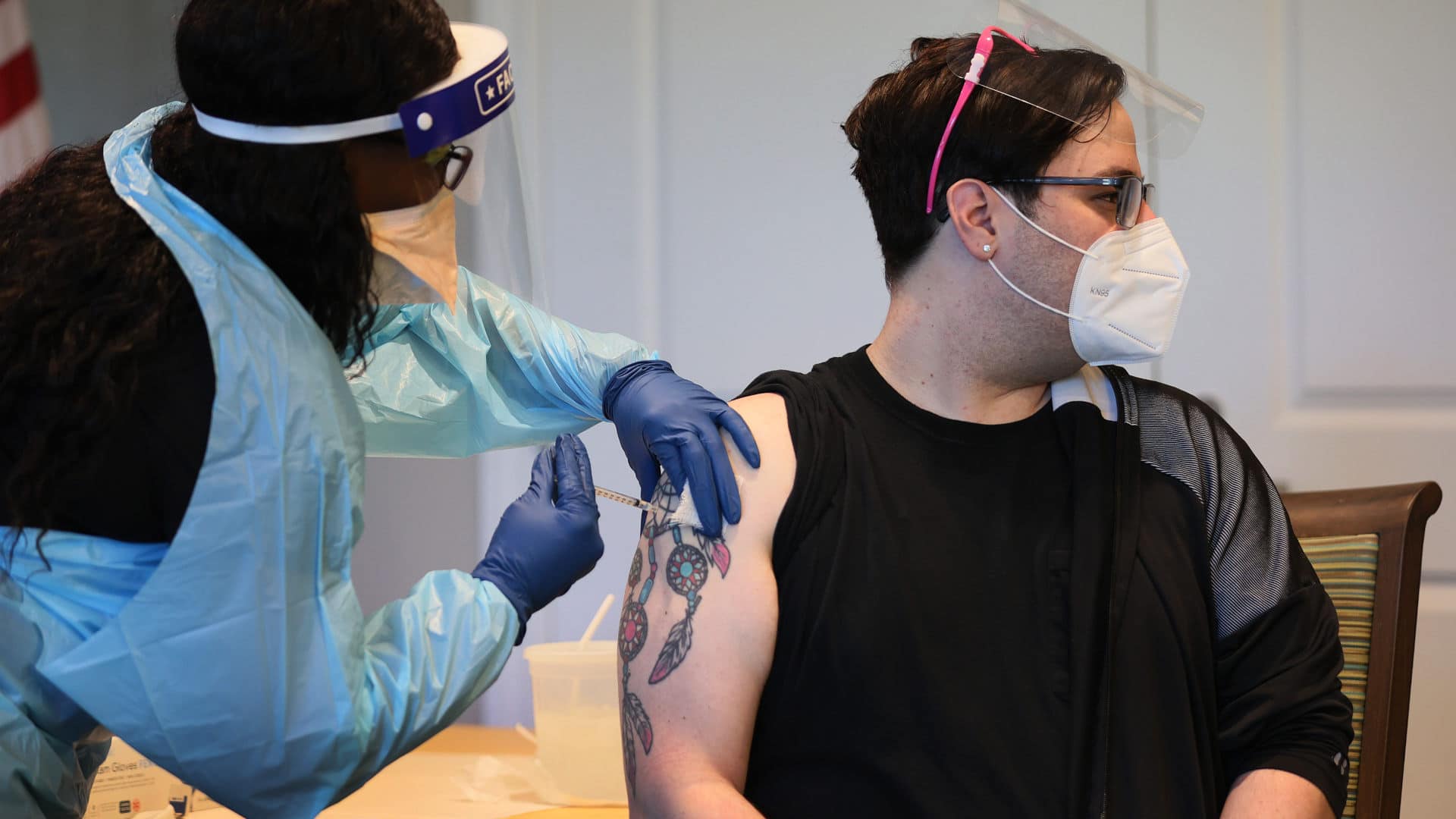In the average U.S. nursing home, more than 82 percent of residents are vaccinated against Covid-19. But among staff, according to federal data, that figure is just 60 percent, because many have not yet opted to receive the shot.
Now, amid growing alarm over new Covid-19 outbreaks in nursing homes, the federal government plans to require vaccination for nursing home staff. “If you visit, live, or work in a nursing home, you should not be at a high risk for contracting Covid from unvaccinated employees,” President Joe Biden said on Wednesday, when he announced the plan.
Nursing homes have been uniquely vulnerable to lethal Covid-19 outbreaks, and more than 133,000 residents have died from Covid-19 since the pandemic began. (That’s more than one-fifth of the total U.S. toll, even though fewer than 0.5 percent of Americans live in a long-term care facility.) When Covid-19 vaccines became available for public use in December 2020, nursing home staff and residents were among the first to be eligible — and soon after, the death rate in such facilities plunged, despite a national surge in cases.
Those vaccines remain highly effective against severe outcomes from Covid-19. But, by this summer, some experts were warning that unvaccinated staff members were contributing to outbreaks in facilities, including among vaccinated residents. Such breakthrough infections appear to be growing more common, and in some cases they can be harmful — and even fatal — for older people.
Recently, some large nursing home operators have mandated vaccination for staff. So have some states, including New York and Massachusetts. The White House plan, which is not an outright mandate, would instead withhold crucial Medicare and Medicaid funding from facilities with unvaccinated staff.
As early as December 2020, some analysts were warning that many nursing home workers were hesitant about taking vaccines for a range of reasons, including distrust between staff and leaders at many facilities. And disputes about vaccination of nursing home staff are not new: For years, some experts have expressed concerns over low influenza vaccine uptake, with states taking a range of approaches to encourage or mandate flu shots.
While the new Covid-19 vaccination policy may help to combat the spread of coronavirus through long-term care facilities, some staff members and analysts are worried that it will exacerbate ongoing staffing shortages. “How can the Biden admin minimize loss of workers?” Harvard University long-term care researcher David Grabowski asked on Twitter this week. His answer: “Start with improving pay and working conditions for direct caregivers.”
Absent that kind of systemic change, more challenges may be ahead for the country’s long-troubled long-term care system. Brandy Little, a nursing home employee in Shaker Heights, Ohio, told WKYC News that she’s worried some of her colleagues will simply leave. “It’s not worth it to them, where they could potentially work at Walmart, Target, any other retailer and make more there than they are at a nursing home,” said Little, who is vaccinated. “So they have no incentive.”
Also in the News:
• After Afghanistan fell to the Taliban earlier this week, countless Afghans have been scrambling to leave the country. Included in those who wish to leave: members of Afghanistan’s all-girls robotics team. In recent years, the team was “hailed in western media as the future of Afghanistan and a shining example of how women’s rights in the country had improved after the U.S. invasion,” wrote Matt Novak at Gizmodo on Monday. Now that future is in question. When the Taliban previously took over Afghanistan in the mid-1990s, most women were forced to leave school and work. While Taliban leaders have claimed that, this time around, the group will not infringe on women’s rights, many remain skeptical. On Tuesday in an op-ed for The New York Times, Malala Yousafzai — who was shot by the Taliban in 2012 for speaking up for girls’ education — wrote: “The activists I spoke with feared a return to religious-only education, which would leave children without the skills they need to achieve their dreams and their country without doctors, engineers, and scientists in the future.” As for the robotics team, human rights lawyer Kimberley Motley is trying to bring them to Canada. “They’re worried about what tomorrow brings,” Motley told CBC on Sunday. “They want to continue to be educated. They want to continue to be the future of Afghanistan. But it’s an extremely tenuous and dangerous situation for them.” On Thursday, the Times reported that some of the members escaped Kabul on a commercial flight, and are now in Qatar. The rest of the girls remain in Afghanistan. (Multiple Sources)
• As the drought in the American West intensifies, the federal government for the first time declared a water shortage this week at Lake Mead, one of the largest reservoirs on the Colorado River. The announcement will reduce water delivery to farmers in the region beginning next year. Lake Mead has fallen to its lowest level since it began to fill after the building of Hoover Dam on the river in the 1930s; it now stands at only 35 percent of capacity. In order to preserve remaining supplies, the Bureau of Reclamation, part of the U.S. Department of Interior, plans to cut water delivery to Arizona by almost 20 percent next year, about 512,000 acre feet. (That’s around 166 billion gallons of water.) Nevada and Mexico will experience smaller cuts in their water supply. Bureau officials warned that even greater reductions may be necessary next year to preserve minimal water levels in the lake, which would also require cutting back the amount of water available to California. This “may not be the worst that the basin may see in the future,” warned one official. (The Arizona Republic)
• On Tuesday, the U.S. Justice Department announced the arrest of a Chicago pharmacist who allegedly sold 125 authentic CDC vaccination cards to presumably unvaccinated people. The pharmacist, 34-year-old Tangtang Zhao, stole the cards from his employer, Company 1, and sold them between March and April 2021 for around $10 apiece, netting $1,277. Zhao was charged on 12 counts of theft of government property and faces up to 10 years in prison for each count. As Ars Technica reports, stolen CDC cards aren’t the only way to fake a Covid-19 vaccination; officials are also seizing counterfeits, including more than 3,000 fake cards intercepted this year in the Area Port of Memphis. Other fake cards have reportedly been showing up online, too, on commerce sites like Amazon and Etsy. As more businesses and schools require proof-of-vaccination for entry, demand for fakes may rise. Some universities, for instance, have expressed concern over students using fake cards in order to attend school this fall. Selling and using stolen or counterfeit cards is a federal crime. “The health and safety of the public is our top priority,” said Special Agent in Charge Lamont Pugh III of the U.S. Department of Health & Human Services in a DOJ press release. “And we encourage people to obtain vaccination cards from their administering medical providers.” (Ars Technica)
• Project Chimps, a Georgia sanctuary that’s home to 77 chimpanzees, is set to begin offering its primates an experimental Covid-19 vaccine, reports Science magazine. The facility joins a growing list of zoos and sanctuaries that are protecting their animals with jabs donated by Zoetis, formerly the animal division of Pfizer. Originally developed for cats and dogs, the vaccine uses engineered spike proteins to provoke an immune response. The San Diego Zoo became the first facility to treat great apes with the injections in February, after eight of its gorillas fell sick with Covid-19. Project Chimps, which has previously come under fire for alleged animal mistreatment, says the majority of its chimpanzees have been trained to receive vaccinations voluntarily. But those that refuse to be pricked, according to executive director Ali Crumpacker, won’t have the vaccine forced upon them. Still, experts at some leading facilities are holding off on ordering the vaccine for their animals, saying they first want to know more about its efficacy. Some question whether an animal vaccine is necessary at all, given the availability of less-invasive measures, such as making sure human employees are vaccinated and wear masks. So far, no chimpanzees — either in captivity or in the wild — are known to have tested positive for Covid-19. (Science)
• Following the detection of a single case of Covid-19, New Zealand announced on Tuesday a nationwide lockdown for three days. The restrictions were slated to last for a full week in Auckland, where a 58-year-old man tested positive, as well as in a coastal town that he visited. Prime Minister Jacinda Ardern called for strict measures, including closing schools, offices, and businesses, and leaving only essential services operational. “We have seen what can happen elsewhere if we fail to get on top of it,” Ardern said in an address to the nation. “We only get one chance.” This snap lockdown announcement, according to the BBC, caused panic among some residents, who rushed to local supermarkets to stock up on goods. Although New Zealand has been able to keep Covid-19 at bay through border restrictions and stringent quarantine procedures, the country has been very slow to roll out vaccines. Currently, only 20 percent of residents are fully vaccinated. On Friday, the country announced it had extended the lockdown for four more days after the detection of additional cases. (BBC)
• And finally: On Monday, Swiss researchers announced they’d set a new record for calculating the exact value of pi, reaching 62.8 trillion digits. (An infinite number of digits follows pi’s decimal point.) It took a supercomputer 108 days and nine hours to make the calculation, according to the Graubuenden University of Applied Sciences, where the research was conducted. The university’s Center for Data Analytics, Visualization, and Simulation declared that the calculation was achieved 3.5 times faster than the previous record. They claim it is also 12.8 trillion digits longer than the current record-holder, an Alabama cybersecurity analyst who calculated the value of pi out to 50 trillion digits last year. The finding, mathematician Julia Collins writes for The Conversation, is “not scientifically useful at all” — but the supercomputing advances that enabled it may have important applications, and the newly-precise value of pi could help probe “fundamental unanswered questions about the way its digits behave.” The Swiss team has not yet released the full figure, except for its final 10 digits: 7817924264. (Popular Mechanics)
“Also in the News” items are compiled and written by Undark staff. Deborah Blum, Brooke Borel, Lucas Haugen, Sudhi Oberoi, and Ashley Smart contributed to this roundup.










